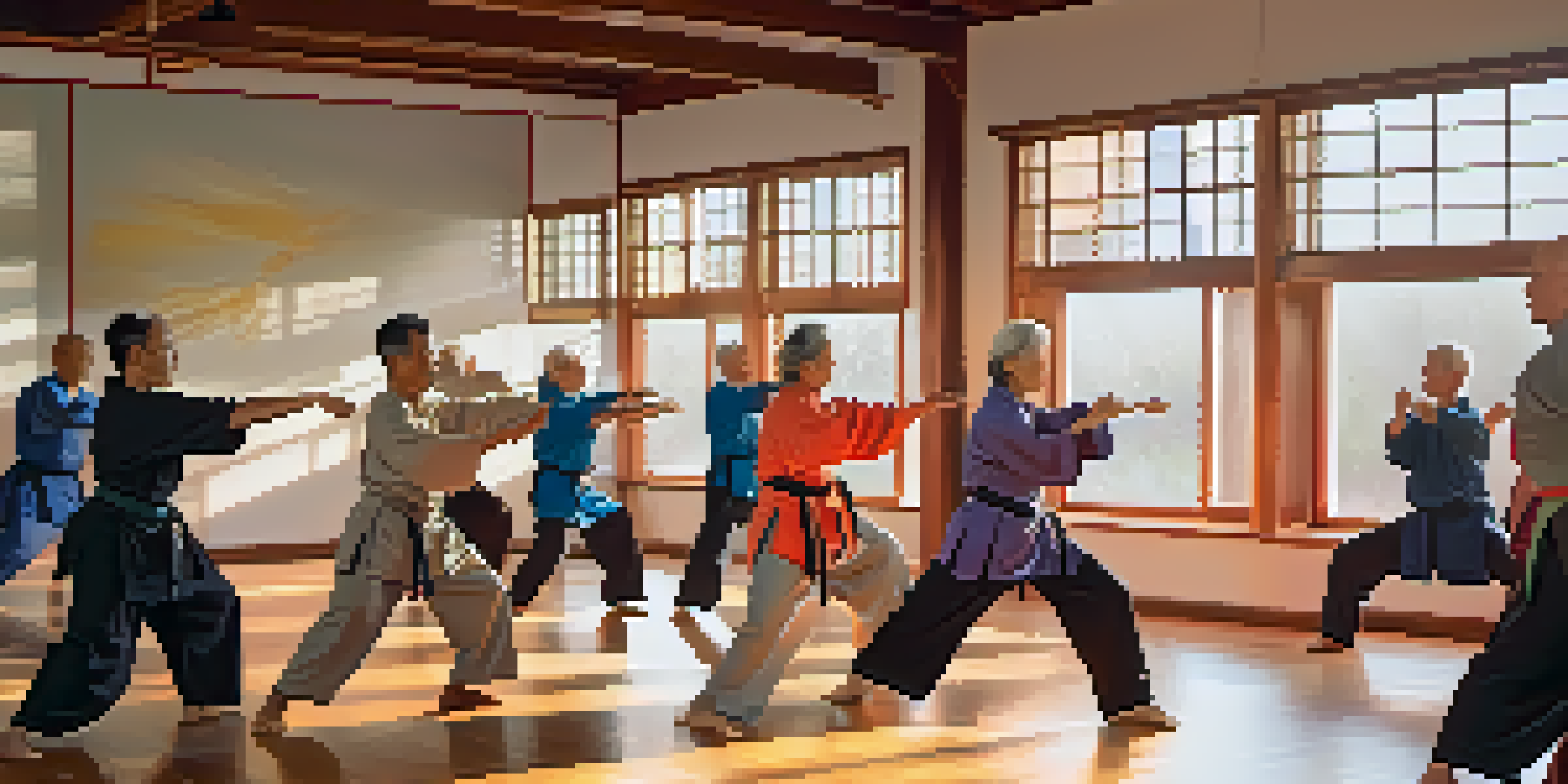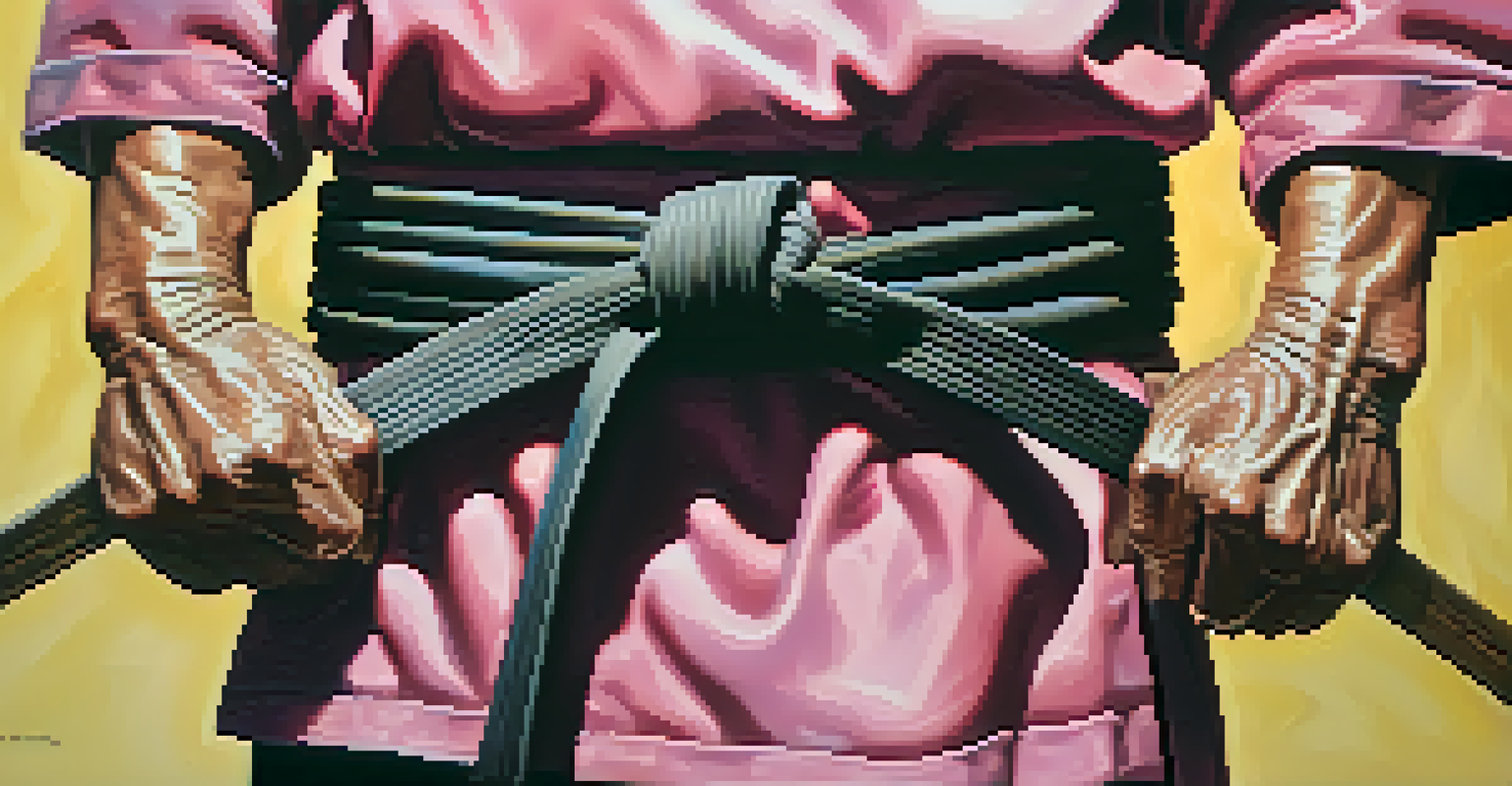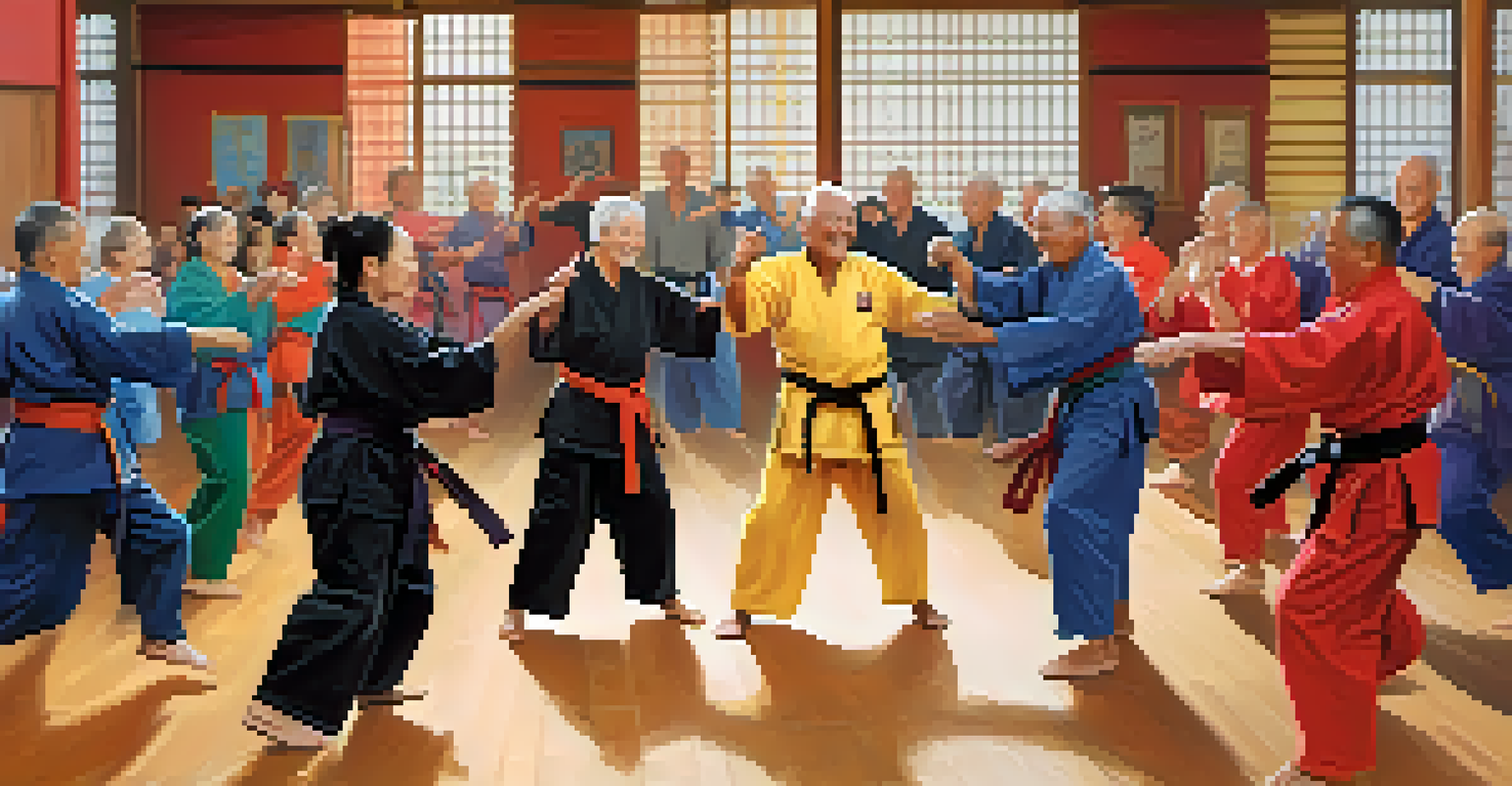Building Confidence Through Martial Arts for Older Adults

Understanding the Benefits of Martial Arts for Older Adults
Martial arts offer a unique blend of physical activity, mental focus, and social interaction, making them an excellent choice for older adults. Engaging in these disciplines can lead to improved balance, strength, and flexibility, which are crucial as we age. Moreover, the structured environment of martial arts classes fosters a sense of belonging and community, which can be particularly beneficial for those feeling isolated.
Martial arts is not about fighting; it's about building a community and empowering individuals.
Many older adults may initially hesitate to join a martial arts class due to concerns about their physical abilities. However, most programs are designed to accommodate various fitness levels, allowing participants to progress at their own pace. This inclusive atmosphere not only reduces anxiety but also encourages individuals to challenge themselves and step outside their comfort zones.
Ultimately, the combination of physical benefits and social support creates a powerful foundation for building confidence. As older adults learn new techniques and achieve personal milestones, they often experience a boost in self-esteem that positively impacts other areas of their lives.
How Martial Arts Foster Discipline and Focus
One of the core principles of martial arts is discipline, which is cultivated through regular practice and adherence to specific techniques. For older adults, learning to focus on mastering these skills can translate into greater mental clarity and the ability to tackle daily challenges. The practice of mindfulness during training sessions allows individuals to be present and engaged, enhancing their overall cognitive function.

In addition to discipline, martial arts require concentration and mental agility, which can help counteract age-related cognitive decline. Techniques often involve memorizing forms, movements, and sequences, serving as a mental workout that encourages sharp thinking and problem-solving skills. This kind of mental engagement can be refreshing and invigorating, bringing a new sense of purpose to daily life.
Martial Arts Boost Physical Health
Regular participation in martial arts enhances cardiovascular health, strength, and balance, which are vital for maintaining independence as we age.
As older adults navigate the intricacies of martial arts, they cultivate not just physical prowess but also an enhanced ability to focus and remain disciplined. This newfound mental strength can lead to increased confidence in other aspects of their lives, from social interactions to pursuing new hobbies.
Social Interaction: Building Connections Through Training
Joining a martial arts class offers older adults a chance to connect with others who share similar interests. The communal spirit of training fosters friendships and encourages socialization, which is vital for mental well-being. As participants work together in pairs or groups, they develop bonds that can alleviate feelings of loneliness and isolation.
The greatest weapon against stress is our ability to choose one thought over another.
Moreover, the shared experience of learning and overcoming challenges creates a supportive environment where individuals can celebrate each other's successes. This camaraderie not only enhances morale but also encourages older adults to push themselves further than they might on their own. Celebrating achievements, no matter how small, reinforces a positive self-image.
These social connections contribute significantly to building overall confidence. When older adults feel valued and supported by their peers, they are more likely to embrace new experiences and approach life with a renewed sense of enthusiasm.
Boosting Physical Health and Well-Being
Regular participation in martial arts can lead to significant improvements in physical health for older adults. The exercises involved in martial arts promote cardiovascular health, strength, flexibility, and coordination—all essential components for maintaining independence as we age. For instance, practicing kicks and stances can enhance balance, reducing the risk of falls.
Moreover, martial arts training can be an effective stress reliever. Physical activity releases endorphins, which help improve mood and overall emotional health. For older adults, this boost in mood can be particularly beneficial in combating feelings of anxiety or depression that may arise from life changes or health issues.
Build Confidence Through Community
The social connections formed in martial arts classes foster a supportive environment, helping older adults overcome feelings of isolation and boost self-esteem.
By investing in their physical health through martial arts, older adults not only improve their fitness levels but also enhance their confidence in their capabilities. Feeling strong and capable in their bodies can translate to a more active and fulfilling lifestyle.
Setting and Achieving Personal Goals
Martial arts training involves setting personal goals, whether it's mastering a new technique or earning a new belt. This goal-oriented approach instills a sense of accomplishment as older adults work toward their objectives. The satisfaction of achieving these milestones can significantly enhance self-confidence and motivate individuals to pursue further challenges.
In addition, the process of setting goals teaches older adults valuable skills in planning and perseverance. They learn to break down larger objectives into smaller, manageable tasks, which can be applied in various aspects of life. This practical approach not only boosts confidence but also empowers them to tackle other personal and professional aspirations.
As older adults achieve their martial arts goals, they often find a renewed sense of purpose and determination. This transformation can lead to a more positive outlook on life and a willingness to explore new opportunities beyond the dojo.
Overcoming Fear and Building Resilience
Fear is a natural feeling, especially when trying something new, like martial arts. However, as older adults face and overcome their fears in a safe and supportive environment, they develop resilience and confidence. Each successful class attended or technique mastered serves as a testament to their ability to confront challenges head-on.
Martial arts training often involves sparring or practicing techniques with partners, which can initially feel intimidating. However, as older adults become more comfortable with these interactions, they learn to trust their instincts and abilities. This newfound confidence in handling confrontation or unexpected situations can extend beyond martial arts, influencing their daily lives.
Set Goals for Personal Growth
Martial arts training encourages older adults to set and achieve personal goals, enhancing their confidence and instilling a sense of accomplishment.
Ultimately, overcoming fear through martial arts fosters a sense of empowerment. As older adults navigate and conquer their fears, they cultivate a belief in their capabilities, paving the way for a more confident and resilient approach to life's challenges.
Finding the Right Martial Arts Style for You
With various martial arts styles available, it’s essential for older adults to find the one that best aligns with their interests and physical capabilities. Styles like Tai Chi or Aikido focus on fluid movement and balance, making them particularly suitable for those looking for low-impact options. Understanding the differences can help individuals make informed choices based on their preferences and goals.
Many martial arts schools offer introductory classes or trial sessions, allowing older adults to explore different styles without commitment. This exploration is not only fun but also provides an opportunity to meet instructors and fellow students, which can be a significant factor in feeling comfortable and welcome. It’s all about finding the right fit!

Ultimately, the right martial arts style can serve as a gateway to enhanced confidence and well-being. When older adults engage in a practice they enjoy, they are more likely to stick with it, reaping the long-term benefits of increased confidence and improved health.